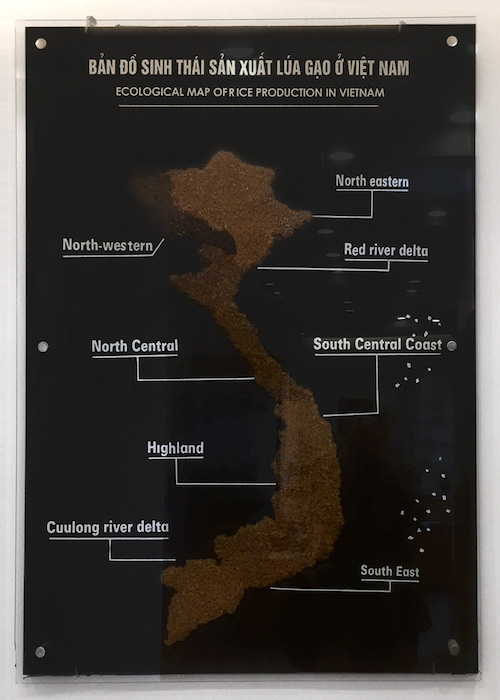A hand-crafted map on the wall of the Vietnam Academy of Agriculture Sciences (VAAS) neatly captures the country’s strategic vulnerabilities as it emerges as a dynamic new regional player. The map is fashioned out of grains of rice to demonstrate Vietnam’s agricultural production prowess, but it is the carefully placed dots in the ocean to the east that stand out in an otherwise innocuous piece of folk art.

Even the most rudimentary maps in Vietnam seem to contain the Paracel and Spratly Islands, serving to emphasise the country’s territorial tensions with China. But it also demonstrates its exposure to water and weather challenges as a sliver of land with 95 million people squeezed between the Mekong River and the South China Sea.
During a weeklong tour in Vietnam to examine new Australian connections, two matters keep re-emerging in conversation: how to deal with China and a range of climate related issues.
The former wartime enemy has become Australia’s most interesting new diplomatic interlocutor in Southeast Asia – and perhaps more broadly in the region – built on new economic ties, shared strategic interests, and a returning diaspora. And there are many opportunities for Australia to help deal with Vietnam’s own version of a rock and a hard place.
The historic tensions with China are well known, so the way climate issues permeate otherwise conventional discussions about things such as diplomacy, tourism, and exports is more striking.
The impact of China is everywhere. In the ancient city of Hoi An, red-flagged Chinese tour groups clog the streets partly explaining the central government move to seek urgent help this year from UNESCO on protection of its cultural precincts.
Back at the VAAS, the latest complaints about Chinese agents manipulating the trading of Vietnam’s agriculture commodities (this time it was dragon fruit) are high on the agenda for discussion about the quest to diversify the country’s food export markets. In Ho Chi Minh City, there is much quiet speculation about how much Chinese money is flowing into a booming real estate development market, yet below the radar to avoid the attacks that the more public Chinese factories faced last year.
The historic tensions with China are well known, so the way climate and water issues permeate otherwise conventional discussions about things such as diplomacy, tourism, and exports is more striking.
One strategic analyst is much more gloomy about the climate challenge than the China challenge, observing:
The Mekong Delta will be under the sea in 20 to 30 years and the food basket of Vietnam will disappear. If our water management is not good, it will just combine with climate change.
This gloominess reflects the World Bank estimate that approximately 60% of Vietnam’s land area and more than 70% of its population are at risk of climate-related hazards including typhoons, floods, drought, and landslides.
But on water, the China and climate challenges come together. Vietnamese analysts concede that unlike the South China Sea, where there is space for diplomatic jousting over maritime territory, when it comes to their precious Mekong delta, China really controls the tap with its own water use and dam building in neighbouring Laos.
The potential for new bilateral cooperation was underlined in March by the signing of a Strategic Partnership between Australia and Vietnam at the Sydney ASEAN Leaders Summit. But there is also an unusually powerful human dynamic behind this with Vietnam now the fifth largest source of foreign students in Australia.
This is on top of the steady flow of former refugee family children heading back to a homeland which is now one of the fastest growing economies in Asia. Although in Hanoi, it is sometimes pointedly noted that the return of the so-called Vossies (Vietnamese-Australians) is largely a feature of southern Vietnam, from where most refugee families came.
So, Australia needs to read these opportunities for cooperation carefully.
Australia recently provided the air transport (and pre-departure English training) for Vietnam’s first deployment of United Nations peacekeepers to South Sudan in a significant step up in the military relationship, four decades after the end of the Indochina wars.
However, despite manifest nervousness about China one senior Vietnamese commentator observes:
We must be in peace with China and avoid going back to the tension of the 1970s. China is a big source for Vietnamese development.
So, reworking the boilerplate contemporary language of strategic rivalry, this observer suggests that Australia could usefully focus on helping create a “rules-based order of water in the region.”
And there is strong interest in Australian involvement in helping define the terms of engagement for infrastructure construction amid the financial incentives being offered by China’s Belt and Road Initiative. The recently opened – Australian development aid-funded – Cao Lanh Bridge over the Mekong River appears to have given Canberra a lot of credibility in the new regional Great Game over infrastructure.
The strains created by estimated 30% growth in tourism in some parts of the country create opportunities for in-country vocational skills training initiatives to fill the gap between the returning Australian tertiary trained graduates and the parts of the economy where skills shortages are severe.
Vietnam’s imminent ratification of its participation in the revamped Trans-Pacific Partnership trade deal will demonstrate its greater appetite for new regional initiatives than some of its neighbours and Australia is well placed to play a partnership role in this.
Greg Earl visited Vietnam as a member of the Australia-ASEAN Council board.

